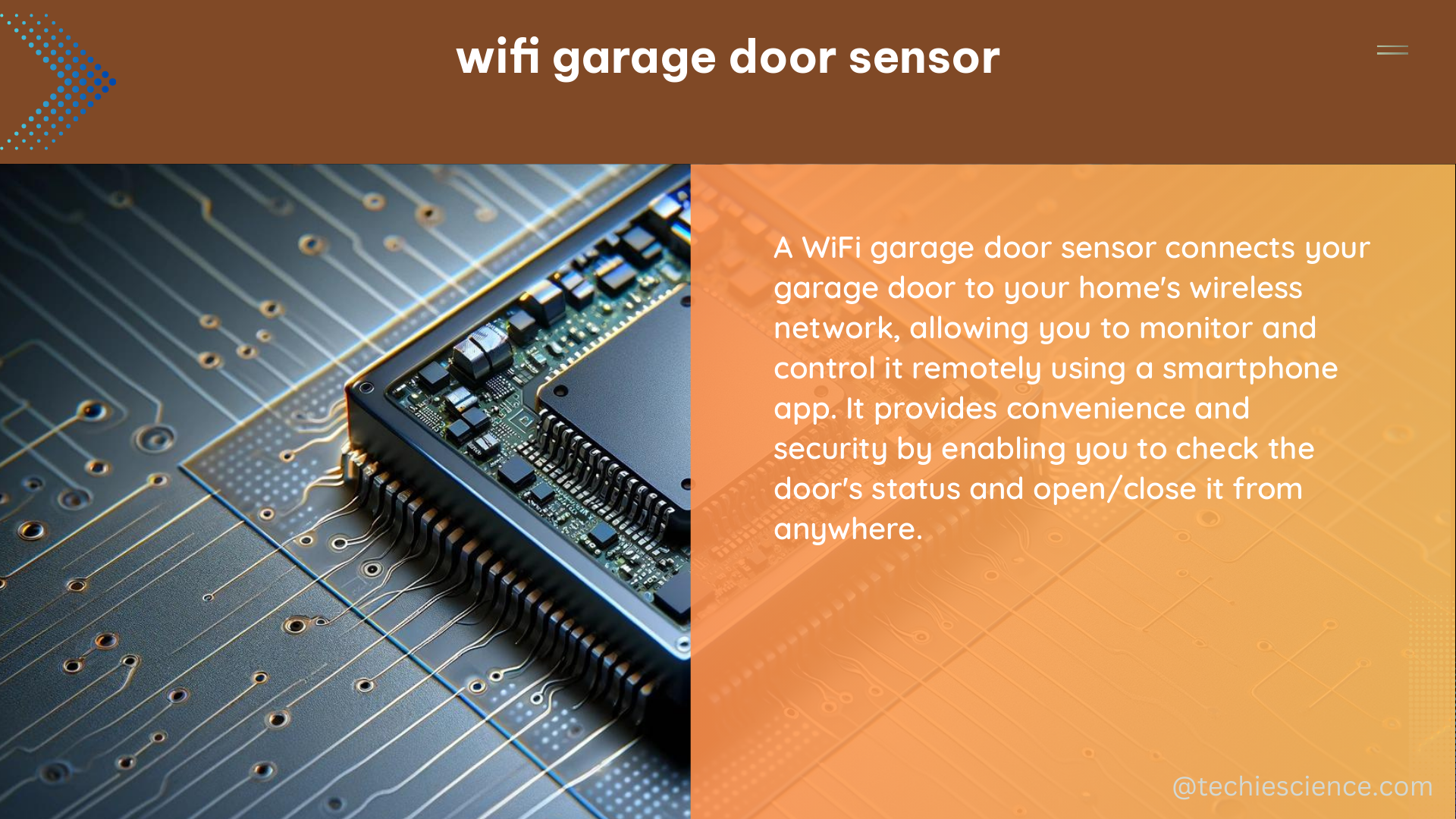A WiFi garage door sensor is a cutting-edge device that allows you to monitor and control your garage door remotely using your home’s wireless network. These sensors typically consist of a controller and a sensor that connect to your existing garage door opener and door, respectively, enabling you to receive real-time notifications and manage your garage door access from the convenience of your smartphone.
Understanding the Technical Specifications of WiFi Garage Door Sensors
When it comes to selecting the right WiFi garage door sensor for your needs, it’s crucial to understand the technical specifications that define its performance and capabilities. Let’s dive into the key details:
Wireless Frequency and Encryption Standards
The Meross Garage Door Opener, a popular WiFi garage door sensor, operates on a 2.4GHz wireless frequency and supports industry-standard encryption protocols such as WPA and WPA2. This ensures a secure and reliable connection between the sensor and your home’s WiFi network.
Working Range and Transmission Power
The Meross Garage Door Opener boasts an impressive maximum working range of 100 meters (328 feet) in an open area, with a maximum transmission power of 19dBm. This extended range ensures that your sensor can maintain a strong connection even in larger garages or homes with complex layouts.
Power Consumption and Adapter Specifications
Powered by a 5V/1A power adapter, the Meross Garage Door Opener has a standby power consumption of less than 1W, making it an energy-efficient choice for your smart home setup.
Response Time and Lifting Force
The Meross Garage Door Opener has been tested to have a lightning-fast response time of less than 1 second for both remote control and notification functions. Additionally, it can handle a maximum lifting force of 15kg (33 pounds), ensuring compatibility with a wide range of garage door systems.
Opening and Closing Speed
With a maximum opening and closing speed of 0.5 meters per second (1.64 feet per second), the Meross Garage Door Opener provides a smooth and efficient operation, minimizing the time it takes to access your garage.
Compatibility and Integration with Smart Home Ecosystems

One of the key advantages of WiFi garage door sensors is their ability to seamlessly integrate with popular smart home platforms, allowing you to control and monitor your garage door from a variety of devices and voice assistants.
The Meross Garage Door Opener, for example, is compatible with Apple HomeKit, Amazon Alexa, and Google Assistant, enabling you to issue voice commands, receive notifications, and manage your garage door through a centralized smart home app.
Subscription Fees and Data Consumption Considerations
It’s important to note that some WiFi garage door sensors, such as the Chamberlain MyQ system, may require a subscription fee for certain advanced features or cloud-based services. Additionally, these devices can consume a significant amount of bandwidth, with some users reporting data usage of up to 2GB per month for their Chamberlain MyQ device.
DIY Installation and Troubleshooting
When it comes to installing a WiFi garage door sensor, the process is generally straightforward, with the Meross Garage Door Opener being a prime example of a user-friendly DIY setup. Most users are able to complete the installation in under an hour, provided that their garage has a strong and reliable WiFi signal.
However, it’s crucial to carefully follow the manufacturer’s instructions to ensure a successful installation and avoid any potential issues. Additionally, troubleshooting steps may be necessary if you encounter connectivity problems or other technical difficulties during the setup process.
Conclusion
WiFi garage door sensors offer a convenient and secure way to monitor and control your garage door remotely, leveraging the power of your home’s wireless network. By understanding the technical specifications, compatibility, and installation considerations, you can make an informed decision and choose the best WiFi garage door sensor to meet your needs and enhance the overall functionality of your smart home.
References:
– Chamberlain MyQ Subscription and Data Usage
– Meross Garage Door Opener Installation and Setup
– How Does a Smart Garage Door Opener Work?

The lambdageeks.com Core SME Team is a group of experienced subject matter experts from diverse scientific and technical fields including Physics, Chemistry, Technology,Electronics & Electrical Engineering, Automotive, Mechanical Engineering. Our team collaborates to create high-quality, well-researched articles on a wide range of science and technology topics for the lambdageeks.com website.
All Our Senior SME are having more than 7 Years of experience in the respective fields . They are either Working Industry Professionals or assocaited With different Universities. Refer Our Authors Page to get to know About our Core SMEs.